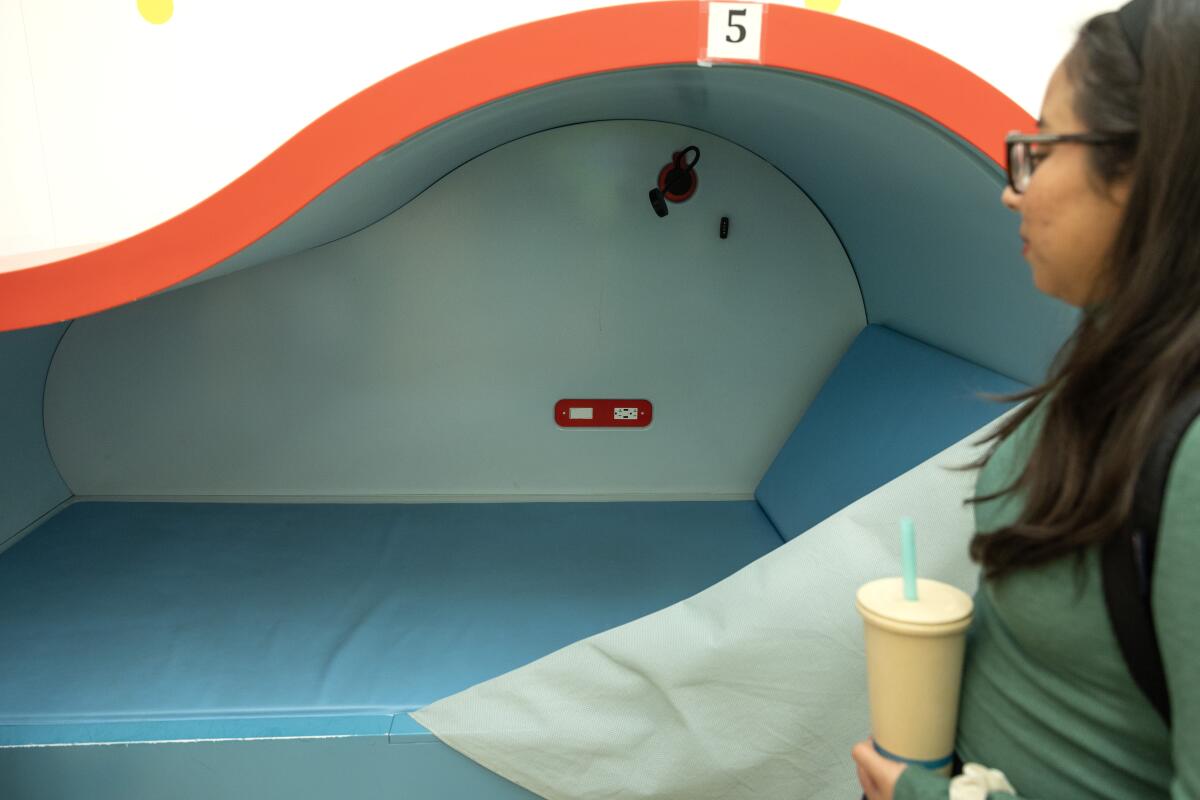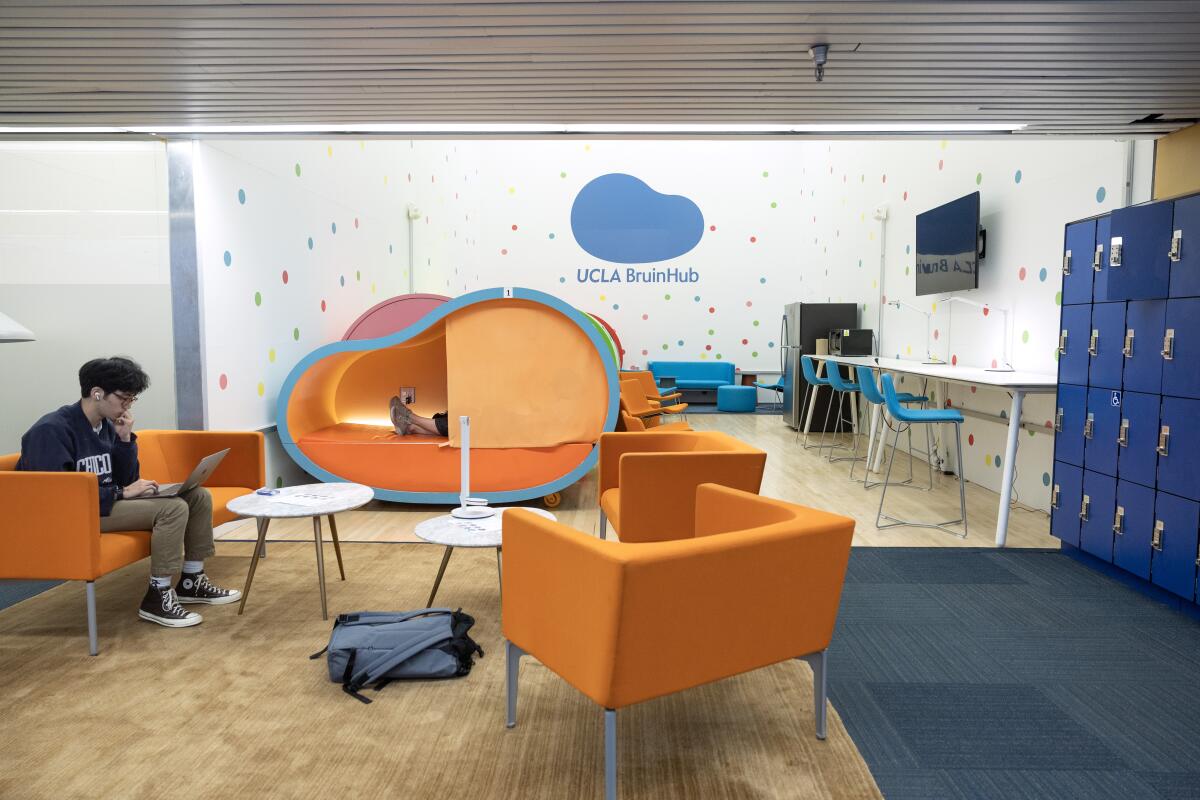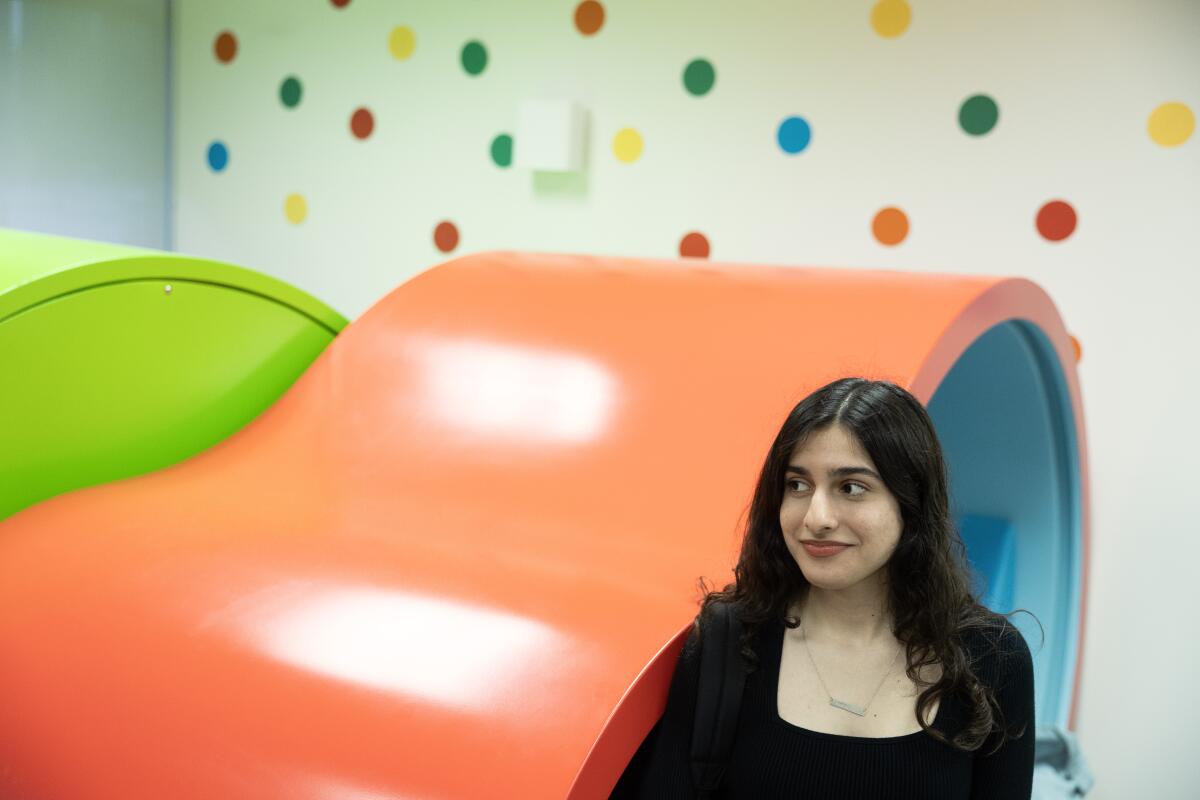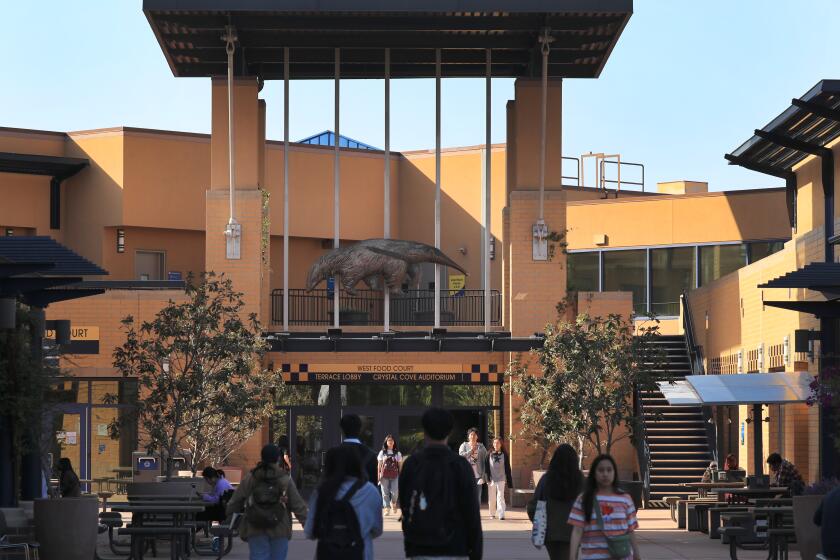Exhausted, hungry and sleep-deprived: UCLA student super-commuters search for relief

- Share via
Sofia Gevorgian’s life as a college student revolves around her nearly one-hour commute to and from UCLA’s campus in Westwood and her family home in the San Fernando Valley.
During her first year, she would race home after the last class of the day around noon, forgoing clubs and social events typically hosted in the evening so she could beat traffic and get home in 30 minutes rather than an hour or more. This year, she’s trying a different strategy: stay at school until 7:30 p.m. to attend office hours and club meetings, and sometimes even later to participate in intramural soccer games.
But the 10-hour-plus school day takes its toll on her, she said.
“I’m just sacrificing so much energy,” she said. “Making the drive home at night when you’re tired is in and of itself exhausting, coupled in with being on campus all day to attend classes and clubs. It’s all a lot.”
To alleviate stresses on student commuters who — unlike campus resident students — have no place to settle down and can feel isolated, UCLA is creating “BruinHubs” where they can rest and study before and after class. The hubs are complete with napping pods, study tables, charging stations, snacks, a microwave and a refrigerator to store meals for their long day on campus.

“Naturally disadvantaged academically by their commute, they don’t have enough time in their days to sleep, study or get together with their study groups,” Dana Cuff, a professor of architecture and urban design at UCLA, said at a recent UC Regents meeting.
The need is great. Nearly half of UCLA’s undergraduate students and the majority of its graduate students live off campus — and 43% of those students commute more than an hour each way, Cuff said.
The push to expand commuter hubs comes as UCLA students, staff and faculty face a lack of affordable housing near campus, said Monroe Gorden, vice chancellor of student affairs.
The University of California is weighing what kind of data science classes could count as math for admission, sparking debate over equity and access.
Fourth-year student Darlene Luna Barahona lives in Santa Clarita. She hits the freeways around 7 a.m. to brave her hour-and-a-half commute to campus. The 21-year-old transferred from College of the Canyons, a community college in Santa Clarita, last school year with a financial aid package that she would rather go toward her tuition than university-affiliated housing — which can cost more than $1,800 per month.
Before starting her part-time job at UCLA’s Transfer Student Center this year, the BruinHub in the John Wooden Center, also home to UCLA’s main gym, was Barahona’s go-to spot after classes to wait out traffic.
“This is my pod,” she laughed, pointing to the pink resting pod in the corner. “I would come here a lot and sit and work on homework and prepare for midterms and finals.”
The resting pods are carved wooden capsules with a small curtain for privacy. Inside the pod, a reading light and outlet allow students to work lying down or sitting up. The colorful furniture and polka dots painted on the tall white walls under fluorescent lighting give a playful feel to the hub.

Identified by UCLA’s Undergraduate Students Association Council as a pressing need, this BruinHub opened in fall 2021 with council funding in an under-used racquetball court. It is open from 5:15 a.m. for early commuters to 1 a.m. A second BruinHub was re-purposed inside a conference room and opened this winter quarter in the Strathmore Building, which also houses UCLA’s Basic Needs Center that provides emergency housing and food for students in need.
A shortage of campus study spaces, particularly during finals, and a lack of places where students could prepare food made it difficult for student commuters to get work done, eat, lie down and recharge phones and laptops.
“There’s a time I didn’t bring food at all, because I didn’t want to spend money on campus, so I would just bring snacks because I knew I needed to eat and I didn’t want to carry my lunch with me the whole day,” Barahona said of her time before she discovered the BruinHubs.
Dominique Peñate, program coordinator for commuter support and programs, knows the struggles of student commuters all too well, having commuted from South Gate before graduating from UCLA in 2022.
“Some students stack their classes and try to only come in twice a week to save on gas and parking, and I used to do the same,” she said.
Gevorgian said the BruinHubs are a good start toward addressing student commuter needs. But she called on the university to offer more online class availability for commuter students and more lenient in-person attendance policies, particularly when bad weather makes driving dangerous. She also advocates for student commuters to have priority to register for UCLA’s limited online course offerings.
“We had the atmospheric rain, really heavy floods last month and professors were still requiring students to come in person and that is a danger to the students themselves,” Gervorgian said. “And if they do choose to stay home, then they would be missing out on class, so that leaves a negative educational impact on the students.”
“I feel like UCLA underestimates how essential it is to have online classes as an option,” Barahona said. “For commuters, it’s just easier to have that option for Zoom.”
University of California applications rose to 250,000 for fall, driven by a rebound in transfer applicants and gains in racial, ethnic and socioeconomic diversity.
UCLA is in discussions to build more BruinHubs in its libraries, in its new 11-story Trust Building in downtown L.A. and at its satellite campus at the former Marymount California University site in Rancho Palos Verdes, Peñate said.
The BruinHubs are not intended to be a substitute for students in need of housing, but to allow the university to tap into underused spaces and re-create them into a space that can help student commuters, Gorden said.
“The BruinHub allows us to think about those niche areas where sometimes students make conscious decisions of where they are living,” he said. “But we do have a need to think about the longer-term housing needs of our students.”
More to Read
Sign up for Essential California
The most important California stories and recommendations in your inbox every morning.
You may occasionally receive promotional content from the Los Angeles Times.
















